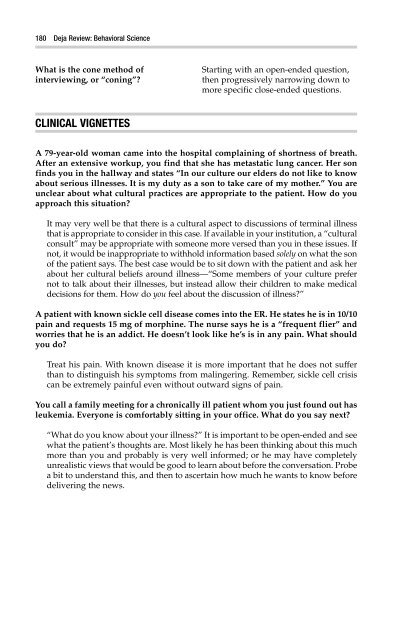Behavioral Science
Create successful ePaper yourself
Turn your PDF publications into a flip-book with our unique Google optimized e-Paper software.
178 Deja Review: <strong>Behavioral</strong> <strong>Science</strong><br />
Your fellow resident gets called in to<br />
work at night and you smell alcohol<br />
on his breath. He says he only had two<br />
beers and asks you not to say anything.<br />
Do you tell someone?<br />
A patient’s sibling asks you for<br />
information about their condition—<br />
do you give it to them?<br />
Can you tell information about a<br />
patient to someone uninvolved in<br />
their care?<br />
You see a former patient at a bar,<br />
whom you treated briefly 10 years ago.<br />
Can you ask them out on a date now?<br />
When is it OK to withhold information<br />
about an illness from a patient?<br />
A patient asks you to do a procedure<br />
that is legal, but is against your belief<br />
system. Must you do it?<br />
What is a good general approach to an<br />
emotional patient—be it angry, sad,<br />
or scared?<br />
What if the patient starts to cry?<br />
What are the steps to giving bad news?<br />
Yes. It’s unethical to endanger patient<br />
care with a possibly impaired physician.<br />
No. You must have formal permission<br />
from the patient to share their health<br />
information with anyone other than<br />
them.<br />
No. This is a violation of the Health<br />
Insurance Portability and Accountability<br />
Act (HIPPA). You should be careful<br />
where and with whom you discuss<br />
any patient information.<br />
No. It is never ethical to have a<br />
romantic relationship with a patient,<br />
former or current.<br />
If the patient tells you they don’t want<br />
to know. It must be the patient that<br />
indicates this—not a family member.<br />
No, you do not need to do anything nor<br />
treat anyone that would compromise<br />
your beliefs. However, you should refer<br />
the patient to someone who will treat<br />
them, as well as provide support in the<br />
meantime.<br />
Label and validate their emotions, then<br />
offer support. Eg: “You sound like you<br />
are scared—I don’t blame you, it’s OK<br />
to be scared about this procedure.”<br />
Let them cry. Try to be comfortable with<br />
silence when appropriate. Offering a<br />
tissue is always a good gesture.<br />
1. Set the stage—find a private place<br />
and ensure you have a proper<br />
amount of time free.<br />
2. Find out what the patient knows<br />
about his/her illness.<br />
3. Find out how much the patient<br />
wants to know.<br />
4. Tell the information.<br />
5. Respond to feelings.<br />
6. Make a plan for next steps.



